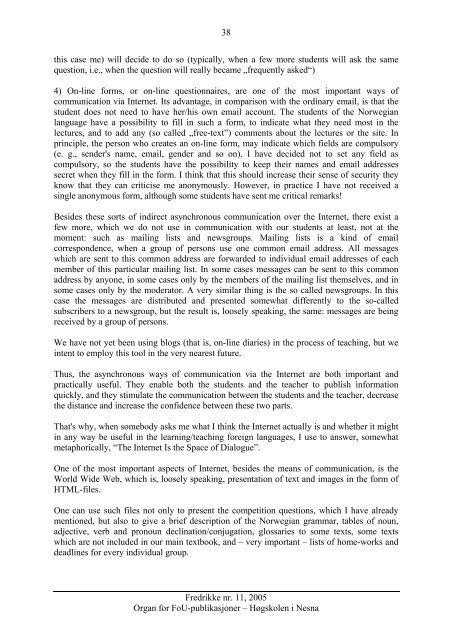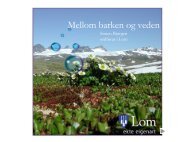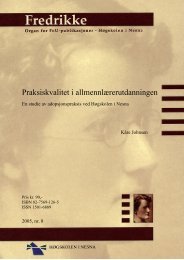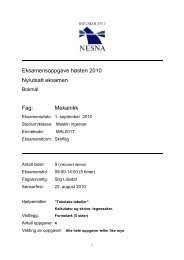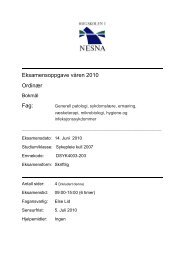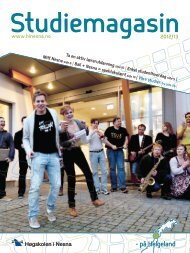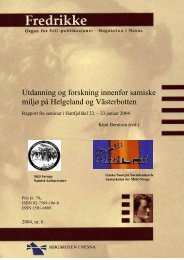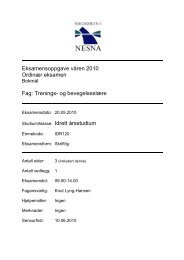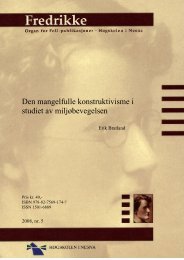ikt-basert norskundervisning i utlandet - Høgskolen i Nesna
ikt-basert norskundervisning i utlandet - Høgskolen i Nesna
ikt-basert norskundervisning i utlandet - Høgskolen i Nesna
You also want an ePaper? Increase the reach of your titles
YUMPU automatically turns print PDFs into web optimized ePapers that Google loves.
38<br />
this case me) will decide to do so (typically, when a few more students will ask the same<br />
question, i.e., when the question will really became „frequently asked“)<br />
4) On-line forms, or on-line questionnaires, are one of the most important ways of<br />
communication via Internet. Its advantage, in comparison with the ordinary email, is that the<br />
student does not need to have her/his own email account. The students of the Norwegian<br />
language have a possibility to fill in such a form, to indicate what they need most in the<br />
lectures, and to add any (so called „free-text”) comments about the lectures or the site. In<br />
principle, the person who creates an on-line form, may indicate which fields are compulsory<br />
(e. g., sender's name, email, gender and so on). I have decided not to set any field as<br />
compulsory, so the students have the possibility to keep their names and email addresses<br />
secret when they fill in the form. I think that this should increase their sense of security they<br />
know that they can criticise me anonymously. However, in practice I have not received a<br />
single anonymous form, although some students have sent me critical remarks!<br />
Besides these sorts of indirect asynchronous communication over the Internet, there exist a<br />
few more, which we do not use in communication with our students at least, not at the<br />
moment: such as mailing lists and newsgroups. Mailing lists is a kind of email<br />
correspondence, when a group of persons use one common email address. All messages<br />
which are sent to this common address are forwarded to individual email addresses of each<br />
member of this particular mailing list. In some cases messages can be sent to this common<br />
address by anyone, in some cases only by the members of the mailing list themselves, and in<br />
some cases only by the moderator. A very similar thing is the so called newsgroups. In this<br />
case the messages are distributed and presented somewhat differently to the so-called<br />
subscribers to a newsgroup, but the result is, loosely speaking, the same: messages are being<br />
received by a group of persons.<br />
We have not yet been using blogs (that is, on-line diaries) in the process of teaching, but we<br />
intent to employ this tool in the very nearest future.<br />
Thus, the asynchronous ways of communication via the Internet are both important and<br />
practically useful. They enable both the students and the teacher to publish information<br />
quickly, and they stimulate the communication between the students and the teacher, decrease<br />
the distance and increase the confidence between these two parts.<br />
That's why, when somebody asks me what I think the Internet actually is and whether it might<br />
in any way be useful in the learning/teaching foreign languages, I use to answer, somewhat<br />
metaphorically, “The Internet Is the Space of Dialogue”.<br />
One of the most important aspects of Internet, besides the means of communication, is the<br />
World Wide Web, which is, loosely speaking, presentation of text and images in the form of<br />
HTML-files.<br />
One can use such files not only to present the competition questions, which I have already<br />
mentioned, but also to give a brief description of the Norwegian grammar, tables of noun,<br />
adjective, verb and pronoun declination/conjugation, glossaries to some texts, some texts<br />
which are not included in our main textbook, and – very important – lists of home-works and<br />
deadlines for every individual group.<br />
Fredrikke nr. 11, 2005<br />
Organ for FoU-publikasjoner – <strong>Høgskolen</strong> i <strong>Nesna</strong>


